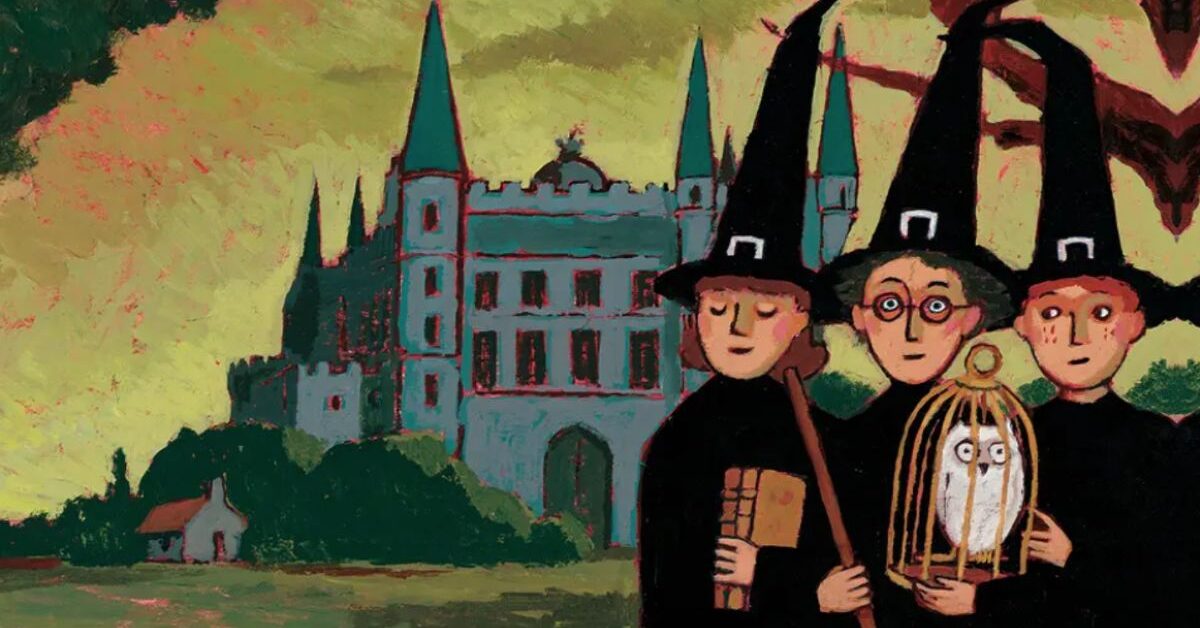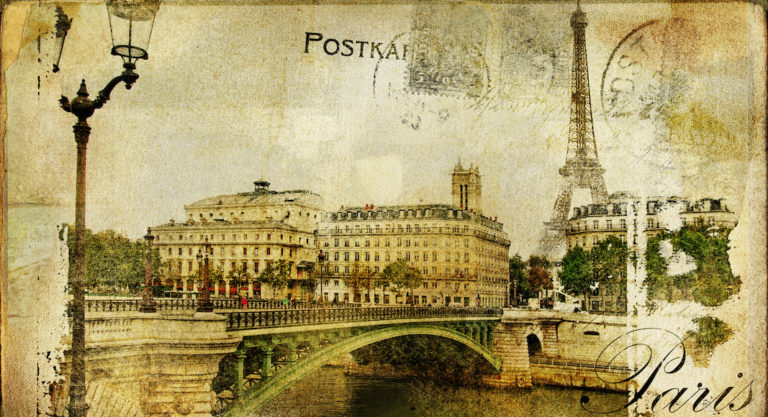The French translation of the first Harry Potter book, translated by Jean-François Ménard, was released on October 9, 1998: Harry Potter à l’école des sorciers (Gallimard).
Though the French language is constantly borrowing and adapting from English, translating made up English words presents its own unique challenge. To prove it, here’s a list of some of the funniest and most interesting French translations of Harry Potter vocabulary. By no means is this a comprehensive list, but it might be enough to inspire you to order a French edition of the book and find out the rest of the translations for yourself.
The Best French Translations of “Harry Potter” Vocabulary:
-
- Poudlard
- Le Choixpeau magique
- Gryffondor
- Poufsouffle
- Serdaigle
- Serpentard
- Moldu
- Dragées surprises de Bertie Crochue
- Une baguette magique
- Le sortilège de Désarmement
- Le Terrier
- Fourchelang
- Le Magicobus
- Un détraqueur
- Pré-au-Lard
- Bièraubeurre
- La Marque des Ténèbres
- Les Mangemorts
- La Salle sur Demande
- Les Reliques de la Mort
- Neville Londubat
- Drago Malefoy
- Nick Quasi-Sans-Tête
- Professeur Chourave
- Severus Rogue
- Maugrey Fol-Oeil
- Barty Croupton
- Dolores Ombrage
- Voldemort / Tom Marvolo Riddle
The Magical World
1. Poudlard
Hogwarts. “Poudlard” comes from “pou-de-lard” which means “bacon lice.” (Bacon lice, hog warts? Get it?)
2. Le Choixpeau magique
The Sorting Hat. The translation is “magical skin choice,” which is disconcerting. It’s also a play on words on “chapeau,” the French word for hat.
3. Gryffondor
Gryffindor. Essentially the same.
4. Poufsouffle
Hufflepuff. Absolutely the best house name since it means “puff blow.” The translator determined Poufsouffle to be the best translation because of the idea behind the name Hufflepuff — huff and puff.
5. Serdaigle
Ravenclaw. Surprisingly, “serdaigle” doesn’t mean “raven claw,” it means “eagle claw.” In the book, the Ravenclaw mascot was changed to an eagle.
6. Serpentard
Slytherin. (“Serpent” is snake.)
7. Moldu
Muggle. It’s a reference to “mou de bulbe” meaning “soft in the head.”
8. Dragées surprises de Bertie Crochue
Bertie Bott’s Every Flavour Beans. “Dragée” is a pill or small candy coated with something.
9. Une baguette magique
This magical baguette is in fact a magic wand. The follow-up question truly is, how many more pages was the French edition of Harry Potter just because every time someone said the six-character (including spaces) word “a wand,” the French book had to fit in the twenty-character word “une baguette magique”?
10. Le sortilège de Désarmement
Another term that got longer in French, the disarming spell is “the spell of disarmament,” just as every other French spell is “the spell of [something].”
11. Le Terrier
The Burrow where the Weasleys live. This is particularly great since a terrier is a small dog… So, in English, the translation would indicate that Ron lives at a terrier (or is it in a terrier?).
12. Fourchelang
If you have this “fork tongue” then you speak parseltongue.
13. Le Magicobus
The Knight Bus. “Magico” is kind of a goofy version of “magique.” (It’s especially amusing to read it as magic-o-bus.)
14. Un détraqueur
A dementor. A “détraqueur“ is something that makes things go wrong or break.
15. Pré-au-Lard
Hogsmead. “Pré-au-Lard” was chosen because it translates to “close to the lard” as in, “close to Poulard.”
16. Bièraubeurre
Butterbeer. It translates as “beer with butter” … how delicious.
17. La Marque des Ténèbres
The Dark Mark. A straight-forward translation, “the mark of darkness.”
18. Les Mangemorts
Death Eaters. Another good ol’ literal translation — “eat deaths.”
19. La Salle sur Demande
The Room of Requirement. This one makes sense, it’s a “room on demand.”
20. Les Reliques de la Mort
The Deathly Hallows, or “the relics of death.”
Characters
Many names stayed the same. Harry Potter, Ron Weasley, Hermione Granger, Albus Dumbledore, Minerva McGonagall, Rubeus Hagrid, Sirius Black, Remus Lupin, Cedric Diggory, Dudley Dursley, James and Lily Potter, all of thet Weasleys, and many more characters, all kept their original names.
21. Neville Londubat
Neville Longbottom. Think of it like “long-du-bas,” or “long-in-the-bottom.”
22. Drago Malefoy
Draco Malfoy. To understand the seemingly simple adjusted translation for this one, you have to know why J.K. Rowling chose Draco Malfoy. “Draco” comes from the latin word for dragon; shortening “le dragon,” the word for dragon in French, makes “Drago.” “Malfoy” comes from the old French “mal foy,” meaning “mauvaise foi,” or “bad faith.” In French, it’s “Malefoy.”
23. Nick Quasi-Sans-Tête
Nearly Headless Nick. Very appropriate, “Nick Partially-Without-A-Head.”
24. Professeur Chourave
Professor Sprout. A “chourave” is a kohlrabi, which is a type of wild cabbage.
25. Severus Rogue
Severus Snape. It’s a great translation — could “Severus Rogue” be any more fitting? In French, “rogue” is not someone who makes their own rules, it’s an old rare word meaning “arrogant” or “unpleasant.”
26. Maugrey Fol-Oeil
Mad-Eye Moody. It’s a reference to the verb “maugréer,” meaning “to mumble.” “Fol-Oeil” is like “crazy-eye.” So in English, if you translated it back to English, his name would be more like Mumble Crazy-Eye.
27. Barty Croupton
Barty Crouch. And the son’s name is Barty Croupton Junior. Honestly this one is funny just because it’s one letter away from “crouton.”
28. Dolores Ombrage
Dolores Umbridge. This one actually is not inspired by the French word “ombre,” meaning shadow. The translator chose “Ombrage” because of a typo on “Umbridge” in Newsweek.
29. Voldemort / Tom Marvolo Riddle
Saved the best for last. Voldemort stayed Voldemort because his name comes from the French “vol de mort” meaning “flight of death.” (Generally, J.K. Rowling seemed to enjoy giving villains names with French roots: Voldemort, Draco Malfoy, Bellatrix Lestrange…) Voldemort’s other names did have to change, though. So “He-Who-Must-Not-Be-Named” became “Celui-Dont-On-Ne-Doit-Pas-Prononcer-Le-Nom” (he of which we should not pronounce the name). “You-Know-Who” became “Tu-Sais-Qui” (you know who). “The Dark Lord” became “le Seigneur des Ténèbres” (the lord of darkness).
But, best of all, Tom Marvolo Riddle became Tom Elvis Jedusor. Elvis. ELVIS! The change was key, because in the third book Riddle explains that if you shuffle the letters of Tom Marvolo Riddle, you get “I am Lord Voldemort.” You can’t shuffle the letters of Tom Marvolo Riddle and get “Je suis Voldemort,” but you can with Tom Elvis Jedusor. Because of the genius of the translator, the pun with Riddle’s last name was not lost: Jedusor sounds like “jeu de sort,” meaning a game of chances. I wonder how long it took the translator to figure that out!
Also Read:






